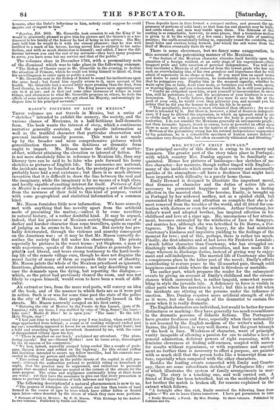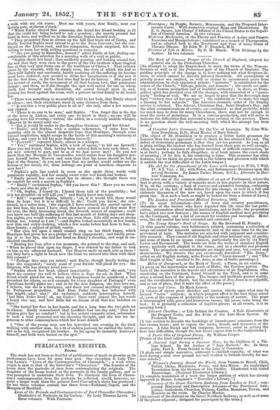MRS. DUNLOP'S EMILIE HOWARD.*
THE principal novelty of this fiction is owing to its scenery and manners. The greater part of the story takes place in Portugal; with which country Mrs. Dunlop appears to be familiarly ac- quainted. Hence her pictures of landscape—her sketches of na- tive character—her manners, though rather tinged with English— many of the incidents which occur in that country and necessarily partake of its atmosphere—all have a freshness that might have been imparted with difficulty to a purely home theme. Emily Howard is designed to illustrate the important moral, that firmness of character and the duties of active life ere necessary to permanent happiness and to inspire a lasting affection in the married state. The heroine, Emily, is brought up in Portugal by her widowed mother, not as a spoiled child, but surrounded by affection and attention so complete that she is al- most removed from the troubles of the world, and ill fitted for con- tention with distress or even for exertion. Arthur Courtenay, her father's ward and adopted brother, has inspired affection in her childhood and love at a riper age. He, unconscious of her attach- ment, becomes entangled by the witcheries of Inez de Sampayo, and marries her' although she was betrothed to De Barros, a Por- tuguese. The blow to Emily is heavy, for she had mistaken Courtenay's kindness and impulsive yielding to the feelings of the moment for love ; and of this, perhaps, there is rather too much. Finally, she first admires and at last loves Sir Frederick Lonsdale ; a much loftier character than Courtenay, who has struggled un- ffinchingly with difficulties and adversities, and has made life a stage whereon to discharge duties, instead of giving way to enjoy- ment and self-indulgence. The married life of Courtenay also fills a conspicuous place in the latter part of the novel; Emily's efforts contributing to restore peaca to the ill-assorted pair, though solid happiness cannot abide where the mind is frivolous or unstable. The earlier .part, which prepares the reader for the subsequent events by giving an account of Emily's childhood and the circum- stances which surround her, is rather languid, somewhat resem-
bling in style the juvenile tale. A deficiency in force is visible in other parts where the narrative is level ; but this is not felt when the incidents are stirring or the persons under the influence of emotion. Mrs. Dunlop requires more artificial strength of style as it were, but she has enough of the dramatist to sustain the scene when it is really dramatic.
The English characters are individual, but would be better for more distinctness or marking : they have generally too much resemblance to the dramatis personte of didactic fictions. The Portuguese have greater freshness and force, especially when their nationality is not lessened by the English medium of the writer's mind. De Barros' the jilted lover' is very well drawn ; but the great triumph of the book is Inez. Weakness of character, want of principle, vanity incapable of allowing a passion for one to subdue a love of general admiration, deficient powers of right reasoning, with a feminine cleverness at finding self-excuses, coupled with sorrow for results without repentance, or with repentance and amend- ment no further than is necessary to effect a purpose, are painted with so much skill that the person looks like a transcript from na- ture, especially when compared with the other characters. Besides the leading events connected with Emily and Courte- nay, there are some subordinate sketches of Portuguese life; one of which illustrates the system of family arrangements in mar- riage. The story is a touching one, and well carried out. A friend of Emily has been betrothed, but on the accidental death of her brother the match is broken off, for reasons explained in the extract which follows.
"A fortnight after this visit, Emily received the following. lines from Sophia—' We are to leave Cintra tomorrow. I have got permission to take • Emily Howard; a Novel. By Mrs. Dunlop. In three volumes. Published by Colburn and Co.
a walk with my old nurse. Meet me with yours, dear Emily, near our Quinta gate, at eleven o'clock.' "When Emily obeyed this summons, she found her friend looking so ill that she could not bring herself to ask a question ; she merely pressed her hand in hers, and walked on in the direction Sophia herself took. "They proceeded thus in silence up the hill that leads out of Cintra, and Emily fancied Sophia must intend to go to the Pena Convent; but she con- Owed on the Lisbon road, and her companion, though surprised, felt un- willing to tease her with trifling questions or remarks.
"'Are you going to Ramalhao, dearest ?' asked Emily at last, feeling un- comfortable at this selection for a morning walk of a road so public. "Sophia shook her head ; then suddenly pausing, and looking around her, she saw that they were close to the grave of the two brothers whose tragical fare at that very spot forms one of the traditions of Chitral- That solitary grave by the wayside, with its simple cross, the story of which she had so often told lightly and carelessly, hardly realizing all the suffering its heroine must have endured, now seemed to strike her imagination as if she saw it for the first time, or for the first time had heard its history. She gazed at the mound of earth, the monument of all that human love, that passionate despair ; and then, as if she thought the spot well suited for one on whom death had brought such desolation, she seated herself upon it, and, leaning her head against the cross, with a gesture invited Emily to sit beside her.
"There was something so mournfully wild in her look, that Emily obeyed in silence ; and their attendants stood at some distance from them.
"'Is not this a very public place to sit in ?' she said, after a few minutes had elapsed. "'There is no one to be seen,' said Sophia. You forget this is the day of the levee in Lisbon, and every one we know is there ; no one will be passing here till evening,—unless,' she added, in a scarcely audible whisper, 'Heaven in its mercy send one.' "'But it would be cooler in the Ramalhao Gardens,' urged her friend.
" ' Emily,' said Sophia, with a sudden vehemence, 'I came here this morning only in the almost desperate hope that Henrique, through some blessed inspiration, might escape in the bustle of this morning's ceremony at Lisbon, and come to bid his poor Sophia farewell.'
" ' Farewell !' repeated Emily, almost in a whisper.
" ' Yes !' continued Sophia, with a look of agony, to bid use farewell! Have you not heard, that, having been ordered first to love each other, we are now ordered to part, and be as if we had never met ? Do you not know that the Marquis de Vasconcellos would rather hear his daughter per- jure herself before Heaven- and men than that his name should be lost in that of the Souzas ? do you not know that my mother would rather see the heiress of her family die, than infringe one point of heartless etiquette to save her ? '
" Sophia's pale lips curled in scorn as she spoke these words with passionate rapidity, and her usually sweet voice was harsh and broken. Emily passed her arm round her in silence ; she thought there was no comfort for such a sorrow as Sophia's. " ' Emily !' exclaimed Sophia, did you know this ? • Have you no words —have you also no pity ? ' "'Oh, Sophia, I feared fit; I heard them talk of the possibility; but it is too dreadful—it will kill you!' and Emily burst into tears.
" Rill ! ' repeated Sophia, bitterly ; 'ah, if it would kill, there would then be hope : but it is so difficult to die ! Could you know,' she con- tinued, in a softer tone, the anguish I have endured, the mortal agony of my first fear, the tears I have shed, that have seemed as if they must flow for ever, the daily increasing dread, the feverish misery of suspense ; could you know one hall the suffering of this last month of fasting days and sleep- less nights, you would wonder to see me even thus. Life still seems so strong within me, wasted as I am ! '—and Sophia looked mournfully at her hands, now thin and sickly-lookin.g,. which a few weeks before had been to her, in their beauty, a subject of girlish vanity. "Her eyes fell upon a small enamel ring on her third finger, which Henrique had given -her as a pledge of their engagement; and fondly press- ing it to her lips, she laid her head on Emily's shoulder, and wept in un- checked emotion.
"Raising her face, after a few moments, she pointed to the ring, and said, When he placed that upon my finger, I was ordered by my father to look on him as my affianced husband. Can Heaven smile on such acts as these ? can they have a right to break now the bond we entered into then with their full consent ?'
"'Perhaps they may yet relent,' said Emily, though hardly feeling the hope she suggested ; surely some of your friends will plead for you : the Empress who has always loved you= -
Empress, shook her head, almost impatiently. 'Emily,' she said, you know my country too well to believe there is hope for me in that. What friend would plead for me, when my happiness would be considered a bad precedent for others, an evil example for every daughter of Portugal ? even Christiana hardly pities me ; and as for the dear Empress, she does love me, I believe, but she is a foreigner, and dares not counsel anything opposed to Portuguese prejudices. Had Dom Pedro lived, influence fluence with him might—alas ! alas !' she exclaimed, suddenly interrupting herself, had Dom Pedro lived! oh, my Carlos ! these were almost the last words I heard thee say, and how little did we dream dell that has befallen us since !'
"She buried her face in her hands, and for a long time the two girls sat in silence. Emily remembered that Lont/dale had one day said, Does her religion give her no comfort ? ' but to her ardent romantic mind, submission to such a trial presented not one cheering thought, and she was too in- genuous to utter commonplaces which her heart denied."
t "One of the young men saw his betrothed one evening in the dusk walking with another man. In a fit of sudden jealousy he stabbed the latter ; and as he fell, recognized his brother. In his agony he instantly destroyed himself, and both were buried on the spot."



























 Previous page
Previous page